Nietzsches Will to Power Naturalized
Nietzsches Will to Power Naturalized
Translating the Human into Nature and Nature into the Human
Brian Lightbody
Lexington BOOKS
Lanham Boulder New York London
Published by Lexington Books
An imprint of The Rowman & Littlefield Publishing Group, Inc.
4501 Forbes Boulevard, Suite 200, Lanham, Maryland 20706
www.rowman.com
Unit A, Whitacre Mews, 26-34 Stannary Street, London SE11 4AB
Copyright 2017 by Lexington Books
All rights reserved . No part of this book may be reproduced in any form or by any electronic or mechanical means, including information storage and retrieval systems, without written permission from the publisher, except by a reviewer who may quote passages in a review.
British Library Cataloguing in Publication Information Available
Library of Congress Cataloging-in-Publication Data
Names: Lightbody, Brian, author.
Title: Nietzsches Will to power naturalized : translating the human into nature and nature into the human / Brian Lightbody.
Description: Lanham : Lexington Books, 2017. | Includes bibliographical references and index.
Identifiers: LCCN 2016050396 (print) | LCCN 2016050971 (ebook) | ISBN 9781498515771 (cloth : alk. paper) | ISBN 9781498515788 (Electronic)
Subjects: LCSH: Nietzsche, Friedrich Wilhelm, 18441900. Wille zur Macht. | Nihilism (Philosophy) | Values. | Will. | Power (Philosophy)
Classification: LCC B3313.W54 L54 2017 (print) | LCC B3313.W54 (ebook) | DDC 193dc23
LC record available at https://lccn.loc.gov/2016050396
 The paper used in this publication meets the minimum requirements of American National Standard for Information SciencesPermanence of Paper for Printed Library Materials, ANSI/NISO Z39.48-1992.
The paper used in this publication meets the minimum requirements of American National Standard for Information SciencesPermanence of Paper for Printed Library Materials, ANSI/NISO Z39.48-1992.
Printed in the United States of America
Contents
The aim of the present book is to provide a naturalized account of Nietzsches will to power. The primary goal then is to distill from Nietzsches many passages on the subject of will to power in particular and power more generally, a coherent rendering of what will to power is in itself. The attempt to provide a clear, intelligible conceptualization of some idea is a standard approach to philosophical investigation. However, will to power resists easy theorization for several reasons. First, one of the core tenets of will to power is its claim that to conceptualize anything, is to totalize itit is to strip the thing from the dynamic relationships it has to other things and thus to denature it. Thus, one does an injustice to an object or idea by removing it from the very environment which makes it possible. There is, however, another aspect to this: to totalize something so claims will to power is to constellate it in some new way; it is to reinterpret it according to the agenda of some agent, some will. Thus any attempt to understand the will to power is ceteris paribus to falsify and constellate it according to some prior schema. Hence, one cannot get at what anything is in and of itself, the will to power included. Indeed, trying to arrive at something in itself ( Ding-an-Sich ) is breathtakingly incoherent, so Nietzsche avows. Whether, therefore, the above objective of this book proves to be impossible, I leave for the reader to decide.
Notwithstanding these significant philosophical challenges, there are other issues as well. Nietzsches manner of writing and philosophizing presents further complications to an already difficult task. I have therefore attempted, at times, a charitable reconstruction of Nietzsche insights to explicate them better and to make them stronger, philosophically speaking. The following then is an effort to think along and think through Nietzsche as much as it is a book on Nietzsches views.
I use Nietzsches On the Genealogy of Morals as a touchstone in two key ways: First, I believe that Nietzsche articulates a genealogical method. Underpinning this approach is an epistemic model of inquiry called virtue foundherentism. The Genealogy of Morals exemplifies what I take to be the core epistemic schema for all well-warranted empirical investigations. I attempt to extract this method from The Genealogy . Second, Nietzsche provides several naturalized examples of the will to power at work in this magnificent book. I take these examples as concrete manifestations of will to power. I then try to extract the properties of will to power, in the abstract, from these examples.
With all that said, I also supplement my account of will to power by using Nietzsches middle and mature writings. These include Human All Too Human, Daybreak , The Gay Science , Beyond Good and Evil , Twilight of the Idols , The Anti-Christ , Ecce Homo , Nietzsche Contra Wagner as well as notes and selections from Kritische Gesamtausgabe (KGW) Kritische Studienausgabe (KSA), Kaufmann and Holingdales The Will to Power and, where appropriate, Ludovicis translation of the same work. The use of The Will to Power may be controversial given the problems with its supposed authenticity as identified by Bernd Magnus and others. However, it is undeniable that there are dozens of profound ideas in this work that, while may not be Nietzsches thoughts to the letter, are certainly in keeping with his spirit and philosophy.
When the position is understood and articulated well, it is the subject of savage attack in the secondary literature; even by those who are, by all accounts, scholars of Nietzsches work. The idea is often considered to be an ill-conceived attempt to narrate absolute becoming or to impose the idea of will, a notion Nietzsche seems to reject clearly, onto reality.
My task in this work is twofold: First, I attempt to articulate will to power in all its many facets. I endeavor to show how we may comprehend will to poweras much as any comprehension is possibleand that it is will to power that ties together and explains Nietzsches ontology, epistemology, and ethical thinking. Will to power, in brief, is an attempt to understand, explain, and measure reality in all its dynamic fluctuations and permutations and yet for all that does not constitute first philosophy in the Aristotelian sense. It is best understood, as
Naturalizing any idea is no easy task and will to power is no exception. My plan of naturalizing is to demonstrate that will to power has causal, scientific supports in much the same manner that a spider web has anchor weights where the web is attached to nearby objects lending stability to the interior threads. Nevertheless, this does not entail that will to power is a scientific theory of either substantive or methodological stripe. The threads of will to power are more akin to channels: Scientific research supports them, but science is shot through with power, agenda, and perspective. There is, then, only a perfect holism of force where even the divisions of outside/inside, subject/environment, I/you, breakdown.
My interpretation is nuanced and subtle and open to misinterpretations especially when interpreters are too beholden to traditional epistemic and metaphysical dualisms (e.g., rationalism vs. empiricism, realism vs. anti-realism, correspondence theories of truth vs. coherentist theories of truth, foundationalist vs. coherentist theories of justification, natural vs. human kinds of things, etc.). I attempt to address these issues and forestall as much confusion as I can as I proceed.
To begin, I will consider, albeit briefly, the idea of ground as a metaphysical term, and the purpose ground serves. The second term that needs to be considered carefully is that of naturalization. I devote much of the present book, indeed an entire chapter, to examining the how and what of naturalismhow does one naturalize some entity or idea and what does it mean to naturalize an object or theory in philosophy. Thus I will not examine the idea of naturalism in any detail in this section as I will cover it extensively in the chapters to follow. What I will focus on in this section is the idea of ground. In the subsequent chapters and sections, I signal how will to power is grounded by scientific research without thereby reducing it to a methodology or school of scientific inquiry.
Next page
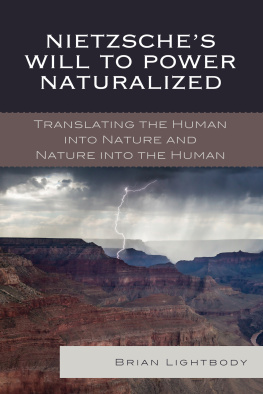


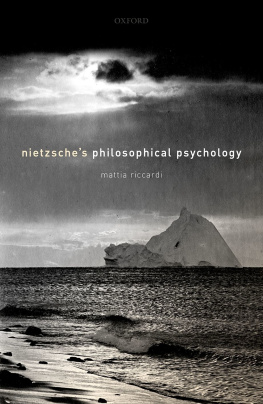
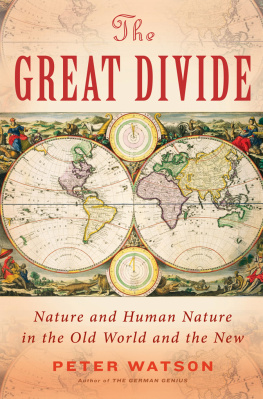
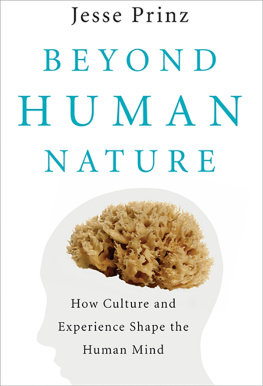

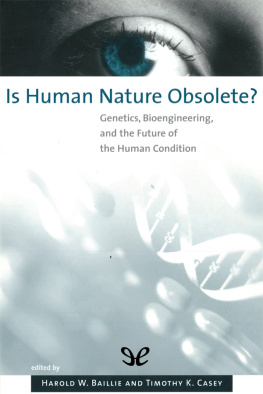
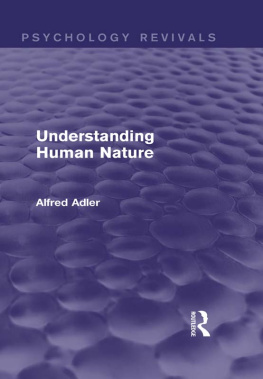
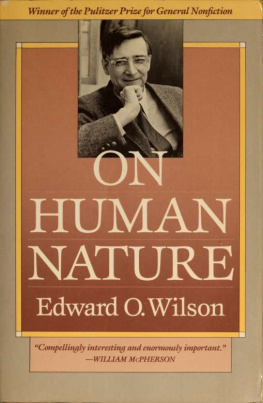

 The paper used in this publication meets the minimum requirements of American National Standard for Information SciencesPermanence of Paper for Printed Library Materials, ANSI/NISO Z39.48-1992.
The paper used in this publication meets the minimum requirements of American National Standard for Information SciencesPermanence of Paper for Printed Library Materials, ANSI/NISO Z39.48-1992.